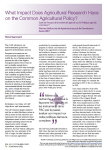Guyomard H. (2025). What impact does agricultural research have on the Common Agricultural Policy? Eurochoices, 01/08/2025, vol. 24, n. 2, p. 72-78.
https://doi.org/10.1111/1746-692X.12470
https://doi.org/10.1111/1746-692X.12470
| Titre : | What impact does agricultural research have on the Common Agricultural Policy? (2025) |
| Titre original: | Quel est l'impact de la recherche agricole sur la Politique agricole commune ? |
| Auteurs : | H. Guyomard |
| Type de document : | Article |
| Dans : | Eurochoices (vol. 24, n. 2, August 2025) |
| Article en page(s) : | p. 72-78 |
| Langues : | Anglais |
| Langues du résumé : | Anglais ; Français ; Allemand |
| Catégories : |
Catégories principales 06 - AGRICULTURE. FORÊTS. PÊCHES ; 6.3 - PACThésaurus IAMM PAC ; RECHERCHE AGRICOLE ; EVALUATION DE L'IMPACT ; EUROPE |
| Résumé : | The Common Agricultural Policy (CAP) and the agricultural research agenda are evolving at the same time. Although the past offers several examples of how research has influenced the CAP in terms of both objectives (progressive inclusion of environmental issues) and instruments (decoupling of income support measures, inefficiency of the ‘greening’ measure of the 2014–2020 CAP), assessing the impacts of agricultural research on the CAP is difficult for many reasons. Such an assessment requires a clear picture of agricultural research programmes, themes and results. It also calls for a robust analytical framework linking research programmes to CAP objectives and instruments in a context where both evolve simultaneously, are influenced by many other determinants, and vary over time depending on the political orientation of governments. Furthermore, European agriculture is influenced by many public policies other than the CAP, at both European Union and Member State level. Research and innovation efforts must ultimately be assessed according to their impacts not on the CAP but on agriculture, food and rural development in a context where assessment criteria must cover all sustainability dimensions, including resilience aspects. We conclude by emphasizing the need for both policy-makers and researchers to recognise explicitly that not all policy objectives are mutually compatible. |
| Cote : | En ligne |
| URL / DOI : | https://doi.org/10.1111/1746-692X.12470 |







